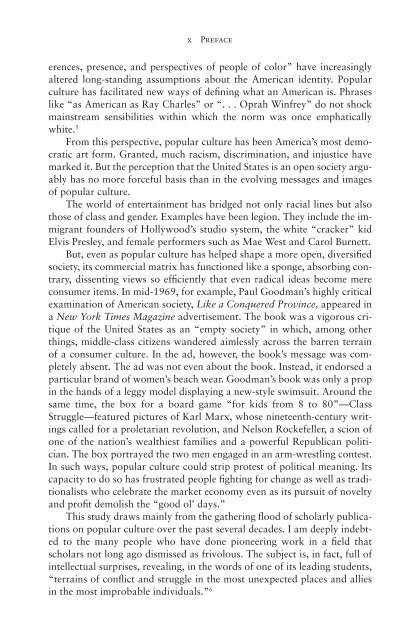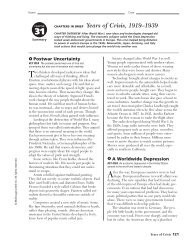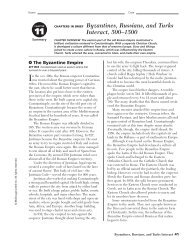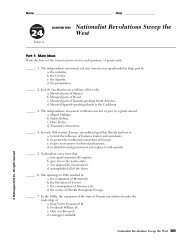- Page 2 and 3: With Amusement for All
- Page 5: Publication of this volume was made
- Page 9: viii PrefaceIt has both provided im
- Page 13 and 14: This page intentionally left blank
- Page 15 and 16: 2 With Amusement for Allsocieties a
- Page 17 and 18: 4 With Amusement for Allphy. Over t
- Page 19 and 20: 6 With Amusement for Allin the colo
- Page 21 and 22: 8 With Amusement for Allthat displa
- Page 23 and 24: 10 With Amusement for Allguished co
- Page 25 and 26: 12 With Amusement for Allwell as th
- Page 27 and 28: 14 With Amusement for Allone side
- Page 29 and 30: 16 With Amusement for Alllittle mor
- Page 31 and 32: 18 With Amusement for Allweapon wou
- Page 33 and 34: 20 With Amusement for Allblack folk
- Page 35 and 36: 22 With Amusement for Allthe histor
- Page 37 and 38: 24 With Amusement for Allbefore neg
- Page 39 and 40: 26 With Amusement for Allcommunitie
- Page 41 and 42: 28 With Amusement for Allshe picked
- Page 43 and 44: 30 With Amusement for Allspectators
- Page 45 and 46: 32 With Amusement for Alllist of po
- Page 47 and 48: 34 With Amusement for Allperiority.
- Page 49 and 50: 36 With Amusement for Alldence game
- Page 51 and 52: 38 With Amusement for Allparty expe
- Page 53 and 54: 40 With Amusement for Allthe boxes,
- Page 55 and 56: 42 With Amusement for Alllittle urb
- Page 57 and 58: 44 With Amusement for Allserve and
- Page 59 and 60: 46 With Amusement for Allbled, as F
- Page 61 and 62:
48 With Amusement for Allety of com
- Page 63 and 64:
50 With Amusement for Alllast words
- Page 65 and 66:
52 With Amusement for Allcharged pe
- Page 67 and 68:
54 With Amusement for All“Brudder
- Page 69 and 70:
56 With Amusement for All(about $31
- Page 71 and 72:
58 With Amusement for Allthe onset
- Page 73 and 74:
60 With Amusement for Allso central
- Page 75 and 76:
62 With Amusement for AllSchmidt ha
- Page 77 and 78:
64 With Amusement for AllBennett po
- Page 79 and 80:
66 With Amusement for Allcide that
- Page 81 and 82:
68 With Amusement for Allinternatio
- Page 83 and 84:
70 With Amusement for Allthe implic
- Page 85 and 86:
72 With Amusement for Allinfluenced
- Page 87 and 88:
74 With Amusement for Allthe circus
- Page 89 and 90:
76 With Amusement for Allcuses. Ant
- Page 91 and 92:
78 With Amusement for Allment with
- Page 93 and 94:
80 With Amusement for Allchildren.
- Page 95 and 96:
82 With Amusement for All“I am so
- Page 97 and 98:
84 With Amusement for Alllaziness o
- Page 99 and 100:
86 With Amusement for Allamusement
- Page 101 and 102:
88 With Amusement for Allwishing th
- Page 103 and 104:
90 With Amusement for Allsons than
- Page 105 and 106:
92 With Amusement for Allit with a
- Page 107 and 108:
94 With Amusement for Allognizable
- Page 109 and 110:
96 With Amusement for Allretire a s
- Page 111 and 112:
98 With Amusement for Allfied belie
- Page 113 and 114:
100 With Amusement for Alltown team
- Page 115 and 116:
102 With Amusement for Allmales to
- Page 117 and 118:
104 With Amusement for Allgame, the
- Page 119 and 120:
106 With Amusement for Allsense of
- Page 121 and 122:
108 With Amusement for Allcondescen
- Page 123 and 124:
110 With Amusement for AllSuffering
- Page 125 and 126:
112 With Amusement for Alling on th
- Page 127 and 128:
114 With Amusement for Allno impert
- Page 129 and 130:
116 With Amusement for Allbut illus
- Page 131 and 132:
118 With Amusement for Allyear afte
- Page 133 and 134:
120 With Amusement for Alltreachero
- Page 135 and 136:
122 With Amusement for Allberths.
- Page 137 and 138:
124 With Amusement for AllBurns not
- Page 139 and 140:
126 With Amusement for AllKubelski
- Page 141 and 142:
128 With Amusement for Allspaces. T
- Page 143 and 144:
130 With Amusement for AllCrazy abo
- Page 145 and 146:
132 With Amusement for Allplished m
- Page 147 and 148:
134 With Amusement for AllThe comin
- Page 149 and 150:
136 With Amusement for Allbecame th
- Page 151 and 152:
138 With Amusement for Allnecessari
- Page 153 and 154:
140 With Amusement for Allried the
- Page 155 and 156:
142 With Amusement for Allfence mov
- Page 157 and 158:
144 With Amusement for Alling point
- Page 159 and 160:
146 With Amusement for AllBible bet
- Page 161 and 162:
148 With Amusement for Allquences.
- Page 163 and 164:
150 With Amusement for All“We adm
- Page 165 and 166:
152 With Amusement for Allple who a
- Page 167 and 168:
154 With Amusement for Allsively cl
- Page 169 and 170:
156 With Amusement for Allranged fr
- Page 171 and 172:
158 With Amusement for AllAlthough
- Page 173 and 174:
160 With Amusement for Alland uncha
- Page 175 and 176:
162 With Amusement for Allsheet mus
- Page 177 and 178:
164 With Amusement for Allsouth of
- Page 179 and 180:
166 With Amusement for All“probab
- Page 181 and 182:
168 With Amusement for Alllar cultu
- Page 183 and 184:
170 With Amusement for Alland the e
- Page 185 and 186:
172 With Amusement for Allhis cynic
- Page 187 and 188:
174 With Amusement for Allerator wh
- Page 189 and 190:
6Popular Culture and Middle-ClassRe
- Page 191 and 192:
178 With Amusement for Alling “Bl
- Page 193 and 194:
180 With Amusement for AllCrucial t
- Page 195 and 196:
182 With Amusement for Allfined”
- Page 197 and 198:
184 With Amusement for Allately to
- Page 199 and 200:
186 With Amusement for Allnies were
- Page 201 and 202:
188 With Amusement for Allthey desp
- Page 203 and 204:
190 With Amusement for Alltheaters.
- Page 205 and 206:
192 With Amusement for AllOriental
- Page 207 and 208:
194 With Amusement for Allfrom adul
- Page 209 and 210:
196 With Amusement for Allfan becam
- Page 211 and 212:
198 With Amusement for AllZiegfeld
- Page 213 and 214:
200 With Amusement for Allthe Midwa
- Page 215 and 216:
202 With Amusement for All1926, her
- Page 217 and 218:
204 With Amusement for Allyour brot
- Page 219 and 220:
206 With Amusement for Allstarted l
- Page 221 and 222:
208 With Amusement for Allcontribut
- Page 223 and 224:
210 With Amusement for Allsetter, b
- Page 225 and 226:
212 With Amusement for Allbrilliant
- Page 227 and 228:
214 With Amusement for Alldemocracy
- Page 229 and 230:
216 With Amusement for AllStreet, U
- Page 231 and 232:
218 With Amusement for AllThe Warne
- Page 233 and 234:
220 With Amusement for Alllift sent
- Page 235 and 236:
222 With Amusement for Allture the
- Page 237 and 238:
224 With Amusement for Allonly said
- Page 239 and 240:
226 With Amusement for Allthe actor
- Page 241 and 242:
228 With Amusement for Allhard soci
- Page 243 and 244:
230 With Amusement for Alldid not c
- Page 245 and 246:
232 With Amusement for AllFranklin
- Page 247 and 248:
234 With Amusement for Allalmost fa
- Page 249 and 250:
236 With Amusement for Alltune.”
- Page 251 and 252:
238 With Amusement for Allbest band
- Page 253 and 254:
240 With Amusement for Allistration
- Page 255 and 256:
242 With Amusement for Alltance.
- Page 257 and 258:
244 With Amusement for Allboxing fa
- Page 259 and 260:
246 With Amusement for All$48 in 19
- Page 261 and 262:
248 With Amusement for Allmake perf
- Page 263 and 264:
250 With Amusement for Allnot contr
- Page 265 and 266:
252 With Amusement for AllThe growt
- Page 267 and 268:
254 With Amusement for AllChicago D
- Page 269 and 270:
256 With Amusement for Alldoor’s
- Page 271 and 272:
258 With Amusement for Allon the si
- Page 273 and 274:
260 With Amusement for Allthey were
- Page 275 and 276:
262 With Amusement for Allwar. Duri
- Page 277 and 278:
264 With Amusement for Allghost tow
- Page 279 and 280:
266 With Amusement for Allwhich hos
- Page 281 and 282:
268 With Amusement for AllBaltimore
- Page 283 and 284:
270 With Amusement for Allwe’re f
- Page 285 and 286:
272 With Amusement for Allarea, flo
- Page 287 and 288:
274 With Amusement for Allbeating u
- Page 289 and 290:
276 With Amusement for Allanother s
- Page 291 and 292:
278 With Amusement for Allfantasy s
- Page 293 and 294:
280 With Amusement for AllPopular c
- Page 295 and 296:
282 With Amusement for Allanother R
- Page 297 and 298:
284 With Amusement for Alllike tryi
- Page 299 and 300:
286 With Amusement for AllLeague ga
- Page 301 and 302:
288 With Amusement for AllPerhaps b
- Page 303 and 304:
290 With Amusement for Allcy with a
- Page 305 and 306:
292 With Amusement for Allproducts
- Page 307 and 308:
294 With Amusement for Allthe Motio
- Page 309 and 310:
296 With Amusement for Alljust join
- Page 311 and 312:
298 With Amusement for Allentertain
- Page 313 and 314:
300 With Amusement for AllGunsmoke
- Page 315 and 316:
9Counterpoints to Consensus“The s
- Page 317 and 318:
304 With Amusement for AllThe brood
- Page 319 and 320:
306 With Amusement for Alland all t
- Page 321 and 322:
308 With Amusement for Allhis hand.
- Page 323 and 324:
310 With Amusement for Alland, each
- Page 325 and 326:
312 With Amusement for Allof abunda
- Page 327 and 328:
314 With Amusement for Alltitles fe
- Page 329 and 330:
316 With Amusement for Alltial cand
- Page 331 and 332:
318 With Amusement for Allcultural
- Page 333 and 334:
320 With Amusement for Alla big bus
- Page 335 and 336:
322 With Amusement for Allclearly a
- Page 337 and 338:
324 With Amusement for AllCharlie P
- Page 339 and 340:
326 With Amusement for Alltant char
- Page 341 and 342:
328 With Amusement for AllWar fears
- Page 343 and 344:
330 With Amusement for Alling NBC
- Page 345 and 346:
332 With Amusement for AllStill, as
- Page 347 and 348:
334 With Amusement for Allfills a v
- Page 349 and 350:
336 With Amusement for AllWhen the
- Page 351 and 352:
338 With Amusement for Allorder. En
- Page 353 and 354:
340 With Amusement for Allwas the s
- Page 355 and 356:
342 With Amusement for Allcompeting
- Page 357 and 358:
344 With Amusement for AllAs the ev
- Page 359 and 360:
346 With Amusement for Allduced Fat
- Page 361 and 362:
10Popular Culture and1960s FermentD
- Page 363 and 364:
350 With Amusement for Allample, us
- Page 365 and 366:
352 With Amusement for Allment had
- Page 367 and 368:
354 With Amusement for Allasked,
- Page 369 and 370:
356 With Amusement for Allas the me
- Page 371 and 372:
358 With Amusement for AllMinow des
- Page 373 and 374:
360 With Amusement for Allers who w
- Page 375 and 376:
362 With Amusement for Allsues, of
- Page 377 and 378:
364 With Amusement for Alltheless,
- Page 379 and 380:
366 With Amusement for Allcapture a
- Page 381 and 382:
368 With Amusement for Allblack pla
- Page 383 and 384:
370 With Amusement for Allresisted
- Page 385 and 386:
372 With Amusement for AllI ever he
- Page 387 and 388:
374 With Amusement for Alltheir hai
- Page 389 and 390:
376 With Amusement for Allfacility.
- Page 391 and 392:
378 With Amusement for Allthem to
- Page 393 and 394:
380 With Amusement for Allincredulo
- Page 395 and 396:
382 With Amusement for Alltier maga
- Page 397 and 398:
384 With Amusement for Allmother an
- Page 399 and 400:
386 With Amusement for AllShot Libe
- Page 401 and 402:
388 With Amusement for Allback. As
- Page 403 and 404:
390 With Amusement for Allproductio
- Page 405 and 406:
392 With Amusement for Allaudiences
- Page 407 and 408:
11Up for GrabsLEAVING THE 1960SAs t
- Page 409 and 410:
396 With Amusement for All1946, tha
- Page 411 and 412:
398 With Amusement for AllThe exerc
- Page 413 and 414:
400 With Amusement for Allan infusi
- Page 415 and 416:
402 With Amusement for AllAs the ec
- Page 417 and 418:
404 With Amusement for Alloverwhelm
- Page 419 and 420:
406 With Amusement for Allthe actor
- Page 421 and 422:
408 With Amusement for Alltural ide
- Page 423 and 424:
410 With Amusement for Allwith best
- Page 425 and 426:
412 With Amusement for Allder but t
- Page 427 and 428:
414 With Amusement for Allitics (pa
- Page 429 and 430:
416 With Amusement for AllConfedera
- Page 431 and 432:
418 With Amusement for AllIn 1974,
- Page 433 and 434:
420 With Amusement for Alland had b
- Page 435 and 436:
422 With Amusement for Allaters and
- Page 437 and 438:
424 With Amusement for AllAwards, i
- Page 439 and 440:
426 With Amusement for Allterm for
- Page 441 and 442:
428 With Amusement for Allteen year
- Page 443 and 444:
430 With Amusement for Allcontracts
- Page 445 and 446:
432 With Amusement for Alloffered c
- Page 447 and 448:
434 With Amusement for Allfrom a di
- Page 449 and 450:
436 With Amusement for AllThe dance
- Page 451 and 452:
438 With Amusement for Allture in h
- Page 453 and 454:
440 With Amusement for Allmoment a
- Page 455 and 456:
442 With Amusement for Allniently m
- Page 457 and 458:
444 With Amusement for Alllighted i
- Page 459 and 460:
446 With Amusement for Allregarding
- Page 461 and 462:
448 With Amusement for Allon TV, on
- Page 463 and 464:
450 With Amusement for Allchild, bu
- Page 465 and 466:
452 With Amusement for Alldied.”
- Page 467 and 468:
454 With Amusement for Allstriction
- Page 469 and 470:
456 With Amusement for AllTed Turne
- Page 471 and 472:
458 With Amusement for Alltion. Pop
- Page 473 and 474:
460 With Amusement for Allturn with
- Page 475 and 476:
462 With Amusement for AllAmericans
- Page 477 and 478:
464 With Amusement for All2005, the
- Page 479 and 480:
466 With Amusement for AllSexual th
- Page 481 and 482:
468 With Amusement for Allits criti
- Page 483 and 484:
470 With Amusement for Allpeal and
- Page 485 and 486:
472 With Amusement for AllEarnhardt
- Page 487 and 488:
474 With Amusement for Allwho showe
- Page 489 and 490:
476 With Amusement for Allbag,” a
- Page 491 and 492:
478 With Amusement for Alldescripti
- Page 493 and 494:
480 With Amusement for AllCommunist
- Page 495 and 496:
482 With Amusement for AllDaughter
- Page 497 and 498:
484 With Amusement for AllCertainly
- Page 499 and 500:
486 With Amusement for Alllishing h
- Page 501 and 502:
488 With Amusement for Allconcernin
- Page 503 and 504:
490 With Amusement for Alland locko
- Page 505 and 506:
492 With Amusement for Alllegacy wa
- Page 507 and 508:
494 With Amusement for AllThe “en
- Page 509 and 510:
496 With Amusement for Allabout a p
- Page 511 and 512:
498 With Amusement for Alled up hel
- Page 513 and 514:
500 With Amusement for Allshort tim
- Page 515 and 516:
502 With Amusement for AllCBS fired
- Page 517 and 518:
504 With Amusement for Alltion: “
- Page 519 and 520:
506 With Amusement for Allscribed F
- Page 521 and 522:
508 With Amusement for Allit the pr
- Page 523 and 524:
510 With Amusement for Allchanging,
- Page 525 and 526:
512 With Amusement for Allcently pu
- Page 527 and 528:
514 With Amusement for AllBuruma wa
- Page 529 and 530:
516 With Amusement for Allised to p
- Page 531 and 532:
NOTESPreface1. Michael Mandelbaum,
- Page 533 and 534:
520 Notes to Pages 7-1417. Robert M
- Page 535 and 536:
522 Notes to Pages 20-2829. Christi
- Page 537 and 538:
524 Notes to Pages 38-4576. Tucher,
- Page 539 and 540:
526 Notes to Pages 53-6340. Finson,
- Page 541 and 542:
528 Notes to Pages 74-823. Isenberg
- Page 543 and 544:
530 Notes to Pages 89-9839. Toll, B
- Page 545 and 546:
532 Notes to Pages 109-1173. Toll,
- Page 547 and 548:
534 Notes to Pages 125-13636. DiMeg
- Page 549 and 550:
536 Notes to Pages 148-15712. Leith
- Page 551 and 552:
538 Notes to Pages 164-17151. Giddi
- Page 553 and 554:
540 Notes to Pages 180-18910. Ibid.
- Page 555 and 556:
542 Notes to Pages 197-206and a hos
- Page 557 and 558:
544 Notes to Pages 214-22196. Hilme
- Page 559 and 560:
546 Notes to Pages 229-236“Siblin
- Page 561 and 562:
548 Notes to Pages 247-25362. On ra
- Page 563 and 564:
550 Notes to Pages 261-269Baughman,
- Page 565 and 566:
552 Notes to Pages 277-284American
- Page 567 and 568:
554 Notes to Pages 289-296Frontier
- Page 569 and 570:
556 Notes to Pages 304-3096. See, e
- Page 571 and 572:
558 Notes to Pages 317-32441. Weyr,
- Page 573 and 574:
560 Notes to Pages 331-33877. Jones
- Page 575 and 576:
562 Notes to Pages 340-345100. Mill
- Page 577 and 578:
564 Notes to Pages 353-36212. Will
- Page 579 and 580:
566 Notes to Pages 372-378unorthodo
- Page 581 and 582:
568 Notes to Pages 386-394100. Slot
- Page 583 and 584:
570 Notes to Pages 403-411Bulls, 15
- Page 585 and 586:
572 Notes to Pages 419-427Waterman,
- Page 587 and 588:
574 Notes to Pages 435-444108. Geor
- Page 589 and 590:
576 Notes to Pages 451-45924. Ibid.
- Page 591 and 592:
578 Notes to Pages 465-472veys); Jo
- Page 593 and 594:
580 Notes to Pages 479-48498. Diamo
- Page 595 and 596:
582 Notes to Pages 492-499kane, WA,
- Page 597 and 598:
584 Notes to Pages 505-51026. Frank
- Page 599 and 600:
586 Notes to Pages 513-51720 (“ba
- Page 601 and 602:
588 BibliographyButsch, Richard.
- Page 603 and 604:
590 BibliographyKeetley, Dawn. “V
- Page 605 and 606:
592 Bibliography———. “Profe
- Page 607 and 608:
594 BibliographyBailey, Beth, and D
- Page 609 and 610:
596 BibliographyChenoweth, Lawrence
- Page 611 and 612:
598 BibliographyDiMeglio, John E. V
- Page 613 and 614:
600 BibliographyGilbert, James. A C
- Page 615 and 616:
602 BibliographyJohnson, Paul. Sam
- Page 617 and 618:
604 BibliographyLott, Eric. Love an
- Page 619 and 620:
606 BibliographyMurray, Susan, and
- Page 621 and 622:
608 BibliographyReyes, David, and T
- Page 623 and 624:
610 BibliographySmith, Suzanne E. D
- Page 625 and 626:
612 BibliographyWeyr, Thomas. Reach
- Page 627 and 628:
614 IndexAmerica: A Tribute to Hero
- Page 629 and 630:
616 IndexBelushi, John, 424Ben-Hur,
- Page 631 and 632:
618 IndexButton-Down Mind of Bob Ne
- Page 633 and 634:
620 Indexand Great Depression, 234;
- Page 635 and 636:
622 IndexDenver, John, 415, 420Depa
- Page 637 and 638:
624 IndexFirst Blood, 449First Mond
- Page 639 and 640:
626 IndexGuccione, Bob, 398-99Guess
- Page 641 and 642:
628 IndexI Spy, 361, 362“Is That
- Page 643 and 644:
630 IndexLast Picture Show, The, 40
- Page 645 and 646:
632 IndexMcCleary, Jonathan, 9McCom
- Page 647 and 648:
634 Index437; and minstrelsy, 19-20
- Page 649 and 650:
636 IndexPainted Dreams, 251Paley,
- Page 651 and 652:
638 Indexdent recording companies,
- Page 653 and 654:
640 IndexMTV, 468; and music indust
- Page 655 and 656:
642 IndexSitting Bull, 81, 84, 104S
- Page 657 and 658:
644 IndexTanguay, Eva, 125, 129-30,
- Page 659 and 660:
646 Indexies, 225-26; origins of, 1
- Page 661:
648 Index“Will You Love Me Tomorr
















